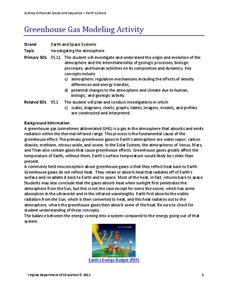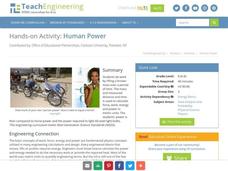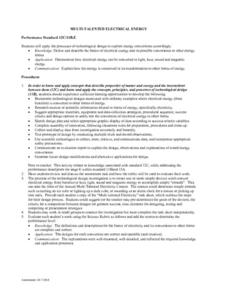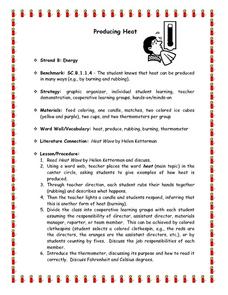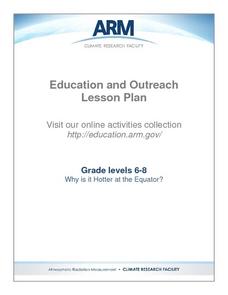Virginia Department of Education
Greenhouse Gas Modeling Activity
Why are greenhouse gases called greenhouse gases? Young Earth scientists learn about greenhouse gases though experimentation in the second installment of a 3-part series. They use lamps to model radiant energy as well as warming through...
American Physiological Society
Why is Kettle Corn Cooked in Copper Pots?
The kitchen — it's not just for eating anymore! Specific heat is often a difficult concept to grasp, so give it context by relating it to cooking. Learners gain experience in the principles of thermal energy transfer by designing an...
Space Awareness
Seasons Around the World
Why does Earth experience summer, fall, winter, and spring? Using an informative demonstration, learners see how the angle of the sun on Earth and the rotation of Earth determine the seasons. Scholars work in pairs to learn that the...
Teach Engineering
Insulation Materials Investigation
Don't melt away! Pairs investigate different insulation materials to determine which one is better than the others. Using a low-temp heat plate, the teams insulate an ice cube from the heat source with a variety of substances. They...
Colorado State University
How Can I Turn a Solar Oven into a Refrigerator?
Whether you want to heat things up in science class or cool things down a bit, an intriguing lab's got you covered! Science scholars explore the principles of thermodynamics using a solar oven, then change the conditions to turn their...
Virginia Department of Education
States of Matter
Scientists have been studying exothermic reactions before they were cool. The lesson begins with a discussion and a demonstration of heat curves. Scholars then determine the heat of fusion of ice and the heat needed to boil water through...
S2tem Centers SC
Seasons
Winter, spring, summer, and fall—take the learning of the seasons beyond the elementary level to the middle school classroom. Curious learners begin by watching videos about the seasons and the rotation of planet Earth. Then, they...
Teach Engineering
Human Power
How many humans does it take to power a light bulb? The 10th part of a 25-lesson Energy Systems and Solutions unit has learners conduct an experiment to calculate power. They then use the results to determine how many classmates they...
Science Matters
Motors
It's time to get moving! The 13th lesson in a 14-part unit on electricity and magnetism explores the relationship between electricity and mechanical energy. Budding scientists build motors and experiment with different components to...
PBS
Insulation Station
It's all about the material. Learners experiment with different substances as they try to keep an ice cube from melting. They draw conclusions by answering a set of questions about the types and amount of material that had the best result.
Curated OER
Electrical Energy
Students conduct an experiment to find out how well different wires radiate heat when voltage is applied across the wire. They use the results of their experiments to consider how the gauge of the wire and the type of wire affect the...
Curated OER
Measuring Thermal Energy Transfer
Students conduct an experiment to calculate and quantify heat transfer. They conduct the experiment, and complete a data and lab conclusion sheet.
Curated OER
Heat and Color
Sixth graders conduct a simple experiment to explore the ways that color can affect heat transfer. They review the three ways that heat can transfer: conduction, convection and radiation.
Curated OER
Let's Learn About Energy Sources
Second graders identify at least four energy sources through sensory experiences.
Curated OER
Heat: The Transfer of Thermal Energy
For this heat worksheet, students complete experiments with heat and answer short answer questions about the transfer of thermal energy. Students complete 4 questions, one chart, and one bar graph.
Curated OER
Multi-Talented Electrical Energy
Young scholars explore energy conversions by demonstrating the conversion of electrical energy into light, heat, sound, and magnetic energy. Students create a simple device that converts electrical energy from batteries to heat, light,...
Curated OER
Heat: Mini Unit
Students experiment with heat. In this physical science lesson plan, students engage in hands-on activities to develop concepts related to heat. Students offer explanations for their observations using given vocabulary.
Curated OER
Energy Conversion
Students describe how energy can be transformed from one form to another. In this physics lesson, students calculate kinetic and potential energy using mathematical equations. They give real life applications of this lesson.
Curated OER
Methods of Heat Transfer
Eighth graders discuss the forms of heat transfer that relate to the human body. Discussion revolves around the ability of different designs of hats to change the rate of heat transfer to and from the body. Students then experiment...
Curated OER
Insulators, Conductors, and Energy Transfer
Third graders conduct experiments to determine what types of material make good insulators. They prepare a graph of time vs. temperature for their sample. They choose a graph using each kind of material to display for class analysis and...
Curated OER
Producing Heat
Students listen to "Heat Wave" by Helen Ketterman and discuss the story by creating a word web with heat as the main topic. They break into groups and conduct an experiment using a thermometer to record the temperature of melting ice...
Curated OER
Beyond Science?: New Energy Age
Students explore, examine, experiment and study the energy believed to exist in the vacuum of space called zero-point energy. They design and build a machine and then place their machines to test zero-pointed energy into a competition.
Curated OER
Why Is It Hotter At the Equator?
Middle schoolers investigate the different heating effects of sunlight. They conduct an experiment that demonstrates the way sunlight strikes the equator, the poles and other parts of the globe.
Curated OER
Solar Hot Box
Students investigate how different colors and materials create various temperatures and apply this it the concept of solar energy.


